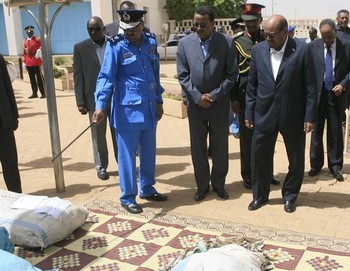Sudanese president to chair new anti-drug council
June 28, 2013, (KHARTOUM) – The Sudanese president, Omer Hassan al-Bashir, has issued a directive to form a supreme council for drug control under his chairmanship with the aim of arriving at a drug-free Sudan.

He expressed commitment to provide the necessary budget to meet the needs of the council, stressing government’s seriousness to fight drugs by developing a strategy which aims at making Sudan free of drugs.
Bashir also issued a directive to provide a land plot e for building an addiction treatment center.
He acknowledged that Sudan has been negatively impacted by drugs, saying that the government is working hard to fight it.
He pointed that drugs decimate youth and waste resources, saying that globalization contributed to the widespread of the phenomenon.
Sudan’s interior minister, Ibrahim Mahmoud Hamid, for his part, said that drug trafficking is a global problem before adding that Sudan is not in the danger zone.
Hamid called for a joint action and coordination between official and popular sectors, and the development of national plans for treatment and fight against addiction.
Last September, anti-narcotics authorities in Sudan rang the alarm bell over what an official described as the “insane” increases in the domestic rate of illicit drugs intake especially among young segments of the population.
Colonel Salah Sinada of the Anti-Narcotics Department at the Sudanese Ministry of Interior revealed that the percentage of the users of Cannabis or Bango as known locally has risen to 34% as extrapolated to the country’s adult population.
Cannabis production and consumption is strictly illegal in Sudan. The country’s struggle with the drug was highlighted in the United Nations’ (UN) 2011 World Drug Report which ranks Sudan as number 12 worldwide in terms of seized amounts of cannabis, with 17,255 kg seized in 2009.
(ST)
